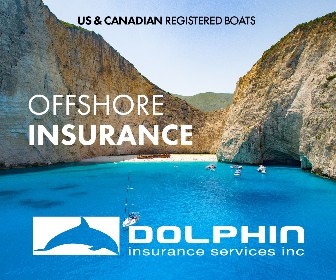Greece: Difficulties Encountered by Yachts with a Non-EU Port of Registry
Published 10 years ago, updated 6 years ago
Some Customs officials (in particular, those in Greece) do not understand the difference between a yacht’s Port of Registry and a yacht’s Flag State. In many cases this is the same country and, therefore, causes no confusion. However, difficulties can arise when the Port of Registry is outside the EU, but the yacht’s flag State IS a member state. This is the situation with many yachts based in the Channel Islands: Jersey, Guernsey and Alderney (see feedback from cruisers who have experienced problems of this nature here).
Yachts officially Part 1 registered in the Channel Islands are British Registered vessels under Merchant Shipping Law (as are those registered in Gibraltar).
A separate issue is whether EU VAT has been paid on the vessel.
When VAT has been paid
If VAT has been paid (or in the case of older EU boats, deemed to have been paid), then there is no restriction on how long the boat can remain in the EU whatever its flag State. Its Port of Registry is entirely irrelevant. If the boat leaves the EU for longer than 3 years, then its VAT-Paid status may be revoked.
An EU VAT-Paid boat (which can include those of the Channel Islands as well as those of any other country) sailed by an EU resident has free, unlimited movement throughout the EU.
What if VAT has NOT been Paid?
In this case, the boat can remain in the EU under a scheme known as Temporary Importation (TI).
How Long can a boat under T.I. Remain in the EU?
This will depend on the country of residence of the owner/skipper.
If the skipper is a resident of an EU country – 1 month
If the skipper is a resident of Iceland or Norway – 6 months
If the skipper is resident outside the EU, Iceland or Norway – 18 months
Can the Period of T.I. be Extended?
Yes, for up to 6 months if it is properly placed ‘in bond’ by Customs.
The easier option is to sail the boat out of the EU (to Turkey, Tunisia or, for now, Croatia), ensure you have evidence of at least 1 night away and then return. In this case, the TI ‘clock’ is restarted and you have a new period of TI.
Other Information
- See the Noonsite European Union VAT [Broken Link]page for more details.
- The above rules only apply to privately owned boats not used for any commercial purpose.
- The length of time the skipper/crew themselves can remain in the EU depends entirely on their nationality and is a separate issue from how long the boat can remain.
Below is an extract from an email sent by Joshua D M Paine, Assistant Registrar of British Ships, Port of Guernsey, to a Channel Islands boat owner who has had difficulties with the Greek Authorities.
The Registry is aware of the issue relating to non-EU vessels in Greek waters and Greece’s unilateral decision to apply its own rules in respect of ‘transit logs’. These legislative provisions have no EU sanction whatsoever.
Regardless of a vessel’s tax status (VAT paid/not VAT paid) the Greek authorities have chosen to take a vessel’s port of Registry (not its Flag status as the means by which to determine whether its owners should pay a further ‘tax’ to obtain a transit log.
All vessels registered under Part I at the port of Guernsey are British vessels under Merchant Shipping Law in the same way that a vessel registered in the UK is a British vessel. A vessel registered under Part I in the UK is a British ship but also regarded, by the Greek authorities, as an EU vessel. Guernsey is outside of the EU and the Greeks fail to understand that just because a vessel has a non-EU port of Registry does not mean that it is not VAT paid or that it is entitled to enjoy the freedom of movement in the EU if VAT has been paid. (the issue of spending 183 days out of the last 360 outside of the EU is a complete red herring).
There has long been an element of confusion in some corners of Europe that a vessel’s tax status and registration are somehow inextricably linked – there is absolutely no link, whatsoever, in law between a vessel’s port of Registry and its liability for EU taxes – liability for tax is dependent on whether a vessel is actually based (permanently imported into the EU – permanent importation does NOT preclude a vessel from having non EU registration – as there is no link between tax and registration.
The test that the Greek authorities apply is whether a vessel is an EU vessel by registration, as they then assume that if it is EU registered and owned by persons resident in the EU that it will AUTOMATICALLY be VAT paid and equally, that if a vessel is not EU registered but owned by persons resident in the EU that there ‘must be something wrong’ and VAT cannot possibly have been paid (at least, that is the implication).
As a result, the Greeks have imposed the following regime on vessels in their waters:
1. EU (e.g. UK) Registered and owned by residents of the EU (e.g. UK) – unlimited period transit log/permit
2. Non-EU Registered but owned by residents of the EU – one month transit log
3. Non-EU Registered and owned by a person resident outside the EU – 6 months transit log
This is all most unfortunate as we have no issues of this nature with any other foreign administration (whether in the EU or further afield). However, the Greek administration has been determined to plough its own lonely furrow in the EU and it would seem that this is unlikely to change anytime soon.
Since becoming aware of this problem we have made approaches to the Greek administration through the UK Foreign & Commonwealth Office and latterly the UK Ministry of Justice to have been met by stone-faced silence.
With kind regards,
Joshua D M Paine
Assistant Registrar of British Ships
Port of Guernsey
Related to the following Cruising Resources: European Union






Posted on behalf of Spain
Isle of Man is not part of EU, but its part of the EU VAT area and EU Customs Area as well. Vessels that are registered in the Isle of Man are treated as European vessels by Customs.
The Channel Islands, Jersey and Guernsey, are part of EU Customs Area, but not part of EU VAT area, that’s why they are treated as non-EU vessels -supposing that VAT is not paid in EU, which is the most usual.
Although the Isle of man is not part of the EU, it IS in the EU VAT/Customs area and so boats registered there need to be VAT paid as per UK boats.
If a boat is registered in the IOM then it should fly the IOM ensign.
Some questions I hope someone can assist with.
If my vessel is registered on the Isle of Man register and I fly the Isle of Man Red Ensign, does that flag count as an EU flag in the same way the British Red Ensign does? If not, am I able to fly a British Red Ensign on a pleasure vessel which is listed on the Isle of Man register?
From 1st of October 2015, transit logs to non-EU vessels and non-EU residents will have 18 months duration -extendable for another 6 months after application- following the EU regulations about Temporary Importation.
Users in this time can change only if the new user is also a non-EU resident. So, it’s essential to prove that you live more than 185 days per year out of EU. Any kind of official document.
Transit log for non EU vessels -no VAT paid- but EU users has 1 month duration…
Customs officers in Greece know exactly the difference between the Flag and Port of Registry -some unfortunate exceptions may exist. In order to avoid misunderstandings and problems about the duration of sailing in European waters, it’s good the users of the boats to be able to prove to Customs the VAT Status of the boat with official documents (Customs clearance and invoice).
Besides, 95% of those that prefer having Port of Registry a non-EU place is exactly to avoid paying the same taxes as those that have British Port of Registry (Great Britain). The same as the British Virgin Islands or Gibraltar.
At your disposal for any question.
Is there anyway, that an EU vessel (flag, registration, port) is not VAT paid by his EU owner (person or company)?
If this vessel used to have American or any non-EU flag-registry-port and he decided to change everything and make them British, then he is not obligated to make a customs clearance and pay VAT? (assuming that he bought the vessel in the USA or any non-EU country).